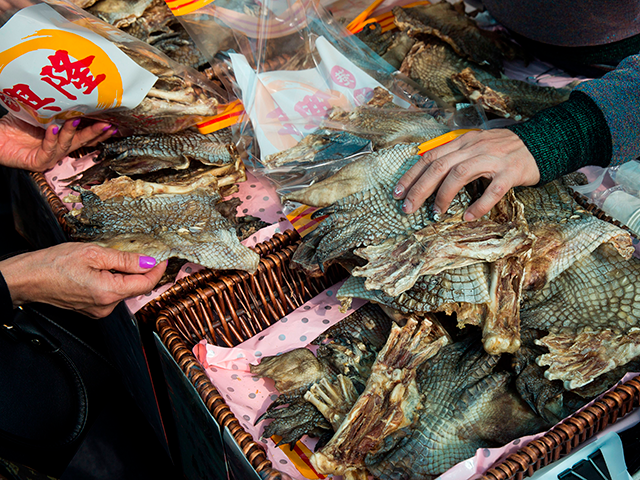A package of crocodile meat from Thailand sold in a Hong Kong supermarket tested positive for the Chinese coronavirus recently, Radio Television Hong Kong (RTHK) reported Wednesday.
Hong Kong health authorities confirmed the meat’s packaging tested positive for the Chinese coronavirus on June 15. City officials clarified that the positive sample was taken from the surface of the packaging material surrounding the meat, noting the meat itself had not tested positive for the disease. The package contained “frozen crocodile spare ribs from Thailand,” according to RTHK. A 17-year-old girl purchased the meat package from the Hong Kong-based supermarket HK Jebn, local news outlet Coconuts Hong Kong reported on June 16. The teenage girl tested positive for the Chinese coronavirus this month, prompting city health officials to search her home as part of an extensive investigation into how she contracted the disease, according to Coconuts Hong Kong.
“[A]mong the environmental samples collected at the residence of a confirmed patient of coronavirus disease 2019 (COVID-19), a sample from the packaging of a prepackaged frozen crocodile spare ribs imported from Thailand was found to be positive for the COVID-19 [Chinese corona]virus,” the Center for Food Safety (CFS) of Hong Kong’s Food and Environmental Hygiene Department said in a statement issued June 15. The center added that “testing for the remaining household environment samples is still ongoing.”
“Upon learning of the incident, the CFS has requested the vendor to stop sale of the product concerned for the time being, and to provide the CFS samples of products for testing, with the results pending,” the statement further read.
Professor Benjamin Cowling, an epidemiologist at the University of Hong Kong’s School of Public Health, told RTHK on June 16 he was “skeptical” that the 17-year-old girl had contracted the Chinese coronavirus from the meat packaging.
“It is unlikely at this point that the infection did occur from contaminated meat packaging,” Cowling told Hong Kong’s public broadcaster. “For this particular possibility, I think the next step is really to look at whether the virus matches.”
“Can we say it’s the same virus on the meat packaging as the virus that infected the girl?” he asked. “Was it the virus on the meat packaging first, and then infecting the girl, or was it that the girl had the infection and breathed on the packaging of meat and that’s how the virus got there — and because it was frozen it was able to stay there?”
“The girl has reportedly admitted to sneezing on the package, suggesting the package was not the source of the virus,” RTHK noted.
“The [Hong Kong] government said at the end of May that over 10,000 samples of food and their packaging had been collected for [Chinese coronavirus] testing,” RTHK recalled on June 16. “The results, including those for over 40 related crocodile products imported from Thailand, were all negative.”
The U.S. Centers for Disease Control and Prevention (CDC) updated its Chinese coronavirus guidelines in May 2020 to state that the disease “does not spread easily” from “touching surfaces or objects.”
“It may be possible that a person can get COVID-19 [Chinese coronavirus] by touching a surface or object that has the virus on it and then touching their own mouth, nose, or possibly their eyes,” the CDC’s website said, adding, “This is not thought to be the main way the virus spreads.”
“People can be infected with the virus that causes COVID-19 through contact with surfaces and objects, however evidence has demonstrated that the risk by this route of transmission is actually low,” CDC Director Dr. Rochelle Walensky told reporters during a White House press briefing April 5.

COMMENTS
Please let us know if you're having issues with commenting.